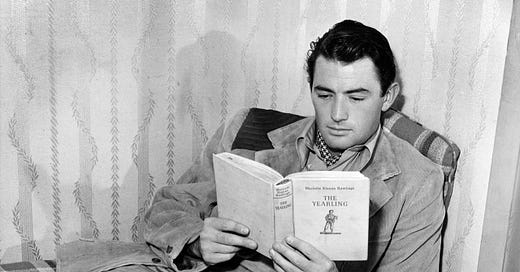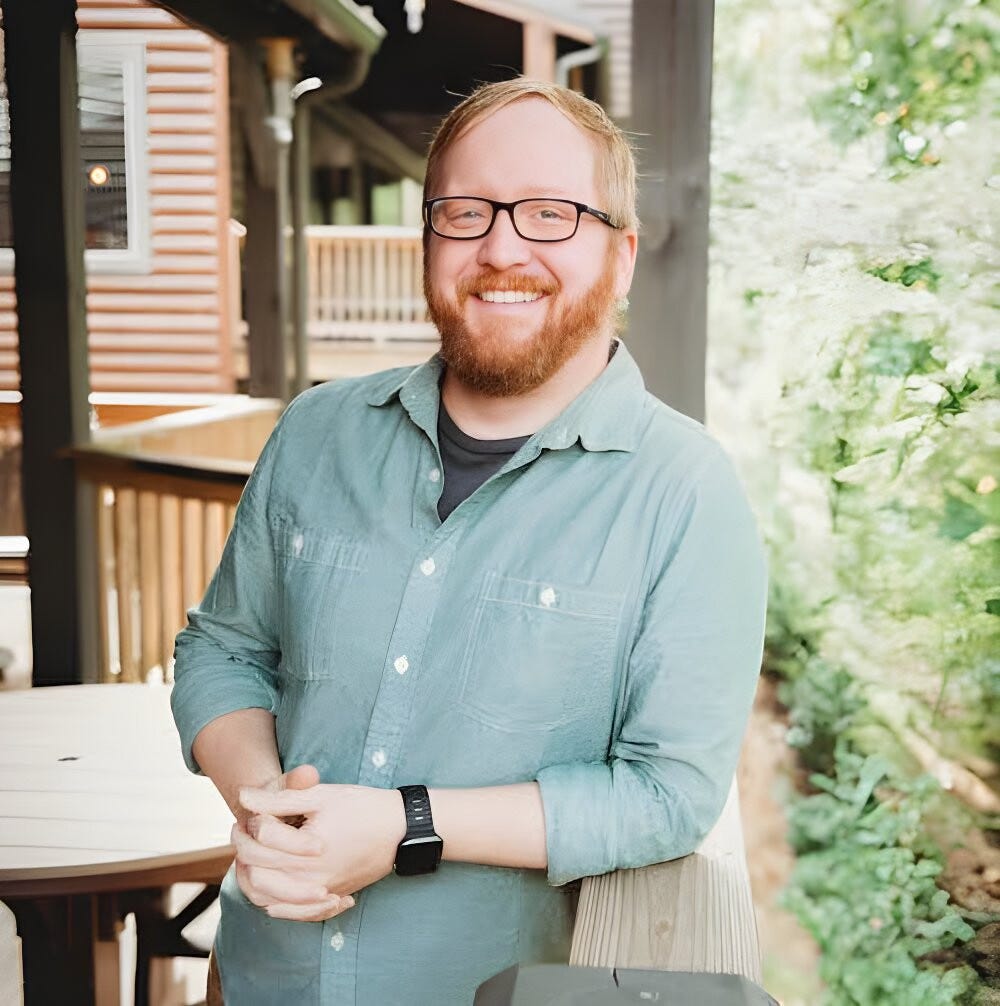Maybe you thrived over the past several years or, like many, found them to be among your most difficult. You survived the COVID pandemic, a tumultuous election cycle, and the breakdown of the global supply chain and now find yourself nearing the end of another year considering what you can do to make next year one of the best ever. If that’s you, let me make my recommendation.
Of all the promises or resolutions I’ve made to myself over the years, one of the most rewarding was to spend more time reading. I recently spoke with
, former managing editor of The Art of Manliness and the creator of the brilliant online book club , about why reading is important and how a person can become a better reader. Jeremy also authors the What to Read Next weekly newsletter where he reviews his most-recently read books, and where he publishes in-depth book reviews, author interviews, and more. As far as sharing love and enthusiasm for books and reading, few do it better than Jeremy Anderberg, and as I expected, Jeremy was full of helpful insights he was happy to share that I believe will benefit you, should your goals for 2023 also include reading more.Why Read More?
Reading takes time and admittedly is often slower than listening to an audiobook or finding a summary online. Why, then, should a goal aimed at personal development include devoting greater amounts of time toward being more inefficient at acquiring information? In How to Read a Book, author Mortimer Adler makes a compelling argument that reading isn’t just about knowing more or increasing the number of facts we know. Rather, Adler suggest that reading is about increasing one’s understanding, even suggesting that in a world of radio and television (and undoubtedly the internet if he had written his book after its invention and evolution), having too many facts often becomes more of an obstacle than having too few. “There is a sense in which we moderns are inundated with facts to the detriment of our understanding,” Adler suggests. Reading, therefore, isn’t just about amassing a collection of information in our minds, but something more.
As one who spends a large portion of his day reading, Jeremy Anderberg is uniquely qualified to provide further insight into the benefits of reading. “Reading,” he says, “gives you empathy about the human condition. You read a biography about Frederick Douglas and it transports you to the world of being a slave like nothing else can.” Following a year largely absent of empathy and manners, it’s not difficult to understand how each of us can improve ourselves by reading to increase our sense of empathy.
As a high school social studies teacher and proud history nerd, I mostly enjoy reading history and biographies. These books, Anderberg advises, can be useful also because they provide “a larger scope of history that is so important to understanding the current moment.” Today we might hear that 2020 was an “unprecedented” year because of the global pandemic or political strife, but through the careful reading of history and biographies, Anderberg suggests, “you realize that we’ve been partisan for much more of our national history than not.”
Renowned author and professor of history Joseph Ellis echoes this point in his book American Dialogue stating that, “reading history is like expanding your memory further back in time, and the more history you learn, the larger memory bank you can draw on when life takes a turn for which you are otherwise unprepared.” Reading history and biographies can provide us with a better perspective on issues, and as Anderberg summarizes, it “gives you a broader scope” through which to see the world.
Given all the improvements we each stand to gain by reading, how could anyone not make it one of their goals to increase the time they spend reading each day?
How to Become a Better Reader
If you’re still reading, maybe you’ve also made the commitment to read more, but maybe you’re also having trouble getting started, or trouble sticking with it. You believe there’s significant personal improvements to be made through reading, but maybe you’ve never been a reader and aren’t sure how to start now. Below are some tips from Jeremy and a few tips that have also worked for me.
Find time to read
Whether you prefer reading in the morning or at night, find a time that works for your schedule and will allow for a consistent routine to develop. For Jeremy, that time is usually around 5:30 in the morning – before his kids are awake. “I…make a cup of coffee and read a book in bed with coffee before the kids wake. I find that it centers my day so nicely.” For me personally, while I would never claim to be a morning person, over the years I have found that I also do my highest quality reading in the morning over a hot cup of coffee. In the mornings, my mind is refreshed and ready to work. Normally being in the middle of several books at one time, Jeremy also added that he does his heavier reading (usually the non-fiction material) in the mornings, and often will read a novel later in the day when he wants to tackle something a little lighter. So think strategically about what kinds of books you want to read at different points throughout the day if you read more than one at a time.
Jeremy also mentioned that he maintains a yearly rhythm to his reading. “I like…liturgical seasons of reading. I read Dickens in January, and I often will read something about Lincoln or the Civil War in April (the month Lincoln was assassinated), and almost always something Christmassy around the Christmas season. I like to build in reading rhythms.” I was interested in this concept of developing a rhythm to reading, and after some reflection realized that I’ve actually had my own reading rhythm for years, even while having been mostly unaware of it. I tend to read lighter topics in the warmer months and as the weather cools I move toward biography or non-fiction books that require a deeper reading. That rhythm fits my schedule well, which, as a teacher, dramatically changes during the summer months. Understanding your reading rhythm and choosing books that better align with it will make it easier to maintain your reading practice year-round.
Create a place to read
Finding an environment that is conducive to your reading goals can be really helpful, although admittedly not essential. I read most of Evan Thomas and Walter Isaacson’s 800+ page book, The Wise Men, while leaning on the kitchen countertop because it was next to the coffee maker and had great morning sunlight through a window facing the east. Over the years, though, I’ve compiled a library of books in my home office and have created an optimal environment there for reading. My current reading space is warm, comfortable, and inviting, with a rich color scheme on the walls, dark wooden bookshelves, and a warm but bright reading light next to my reading chair. I find it inspiring to be surrounded by so many books – around half that I’ve yet to read – and am always perfectly happy to spend a morning reading, a coffee in hand, surrounded by the works of so many talented authors.
The evolution of my reading space took time. I acquired pieces and made changes gradually, but over the years it finally began to look like what I had envisioned all along. Find a spot in your home that will support your reading goals, and over time make it fit your needs and personality more and more, until it becomes the perfect place for you to spend time reading.
Read with friends
Reading with a group was a new concept for me, but one that I enjoy a lot. At the start of 2021 I joined Jeremy Anderberg’s online reading club, The Big Read, for its inaugural year and made it through about half of War and Peace. (I quit about halfway in – more on that later.) Through The Big Read, I found other people who were also interested in tackling some of the more difficult novels, and my reading experience was supplemented by the analysis of Jeremy and other readers. Jeremy curated insightful weekly summaries that were sent to subscribers, and the group of readers maintained a good discussion about the book throughout the reading. There was also a sense of accountability with the book club, because the group progressed along a pre-planned reading schedule. If I missed a day, I had to catch up. This forced me to become and even more consistent reader – a habit that has carried over to current reading projects. Even though I didn’t make it through War and Peace on the first try, I’m still a subscriber to The Big Read and find that the online book community continues to offer a valuable supplement to my reading.
If the idea of sharing your innermost thoughts and feelings about literature with people you’ve never met doesn’t interest you, you’re probably not alone. If that is you, don’t let that stop you from finding a friend or two and creating your own book club. The same sense of accountability and discussion can be shared even among two friends who are reading the same book. It doesn’t have to be official in order to be effective. Even something as simple as, “Hey, how’d you like that last chapter?” can lead to an informative discussion, which can enrich your reading experience unlike anything else.
Don’t be afraid to quit
I can’t count the number of times that I’ve been reading a book and tried to grind through slow sections, completely lost interest, or just didn’t enjoy a book. When that happened, reading became work, and as a result I would start to miss days because I wasn’t looking forward to the reading. My signature move at this point – what I’ll label “the denial phase” – was to leave the book laying out to give the appearance that I fully intended to finish it. Truth be told, I’m still at zero percent on successful comebacks, and I’ve since stopped beating myself up over failed attempts to finish books that weren’t enjoyable.
“I’m much quicker to give up on books that I don’t like” Jeremy told me. “If there’s something that isn’t’ resonating with me, I’m more eager to put it down and pick up something that I will enjoy. You can usually tell within 75 to 100 pages, [but] even if I get to the middle of a book and I’m hating it, I just put it down. Maybe that means trying again sometime in the future; maybe it doesn’t.”
If you’re like the rest of us and have found yourself in this situation before, give yourself permission to move on from the book you aren’t enjoying. Your reading experience shouldn’t be filled with dread; it should be something you look forward to doing. Mastering the art of guiltlessly walking away from a book you don’t enjoy will be one of the most useful tools you can develop to become a consistent reader — and to stay a reader.
Above all, enjoy the process
The bottom line is that if your goal is to read more, you have to enjoy reading. Jeremy says that people often ask him how he reads so much. He says that “it comes down to [making] the time for the things you enjoy doing. I love to read and I love hot coffee, so I get up and do it. It’s truly about enjoyment.”
Find and read books about topics you enjoy. Build the habit of reading around the books that you want to read; you can tackle more difficult books later. “When it comes to reading,” Jeremy advised, “many people have a list of books they think they should be reading and enjoying, but for me it’s just finding the books that I loved. Finding the books you love reading will turn you into a reader.”
As your interests inevitably shift and your tastes grow and evolve over the years, you can progress to the harder books then. James Joyce and Dostoyevsky aren’t going anywhere; they’ll be ready when you are. If you want to give those a shot, go for it! But don’t ruin your reading experience by slogging through a novel you’re hating. Put it back on the shelf and give it another try later. If you’re not looking forward to sitting down with a book, there’s a good chance you're reading the wrong book.
You’ve chosen to follow a noble path and embark on a worthwhile endeavor and I wish you the very best of luck at accomplishing your goals this year. I want to express my gratitude once more to Jeremy Anderberg for taking the time to talk with me and to share his hard-earned wisdom. If you’re still not sure where to start, visit The Big Read and look around; it may just be what you need to get on board with reading more!
If you’ve decided to read more this year, leave a comment and let me know how it’s going. What are you reading? What changes have you made?
Wishing you all the very best in the new year,
If you enjoyed this read, share with someone you think might also be interested. As always, I appreciate your support!









Such a worthwhile habit to cultivate. Loved the rhythm and timeliness of the article. I'll let you know when my book is published, and you can add it to your repertoire. Happy New Year!
Good thoughts. I’d settle for the reading room in the picture, ha. The What To Read Next newsletter is always a good read. It’s actually how I ended up on Substack in the first place.
Also, I remember stumbling across Adler’s book in college. It completely changed how I read. Such a helpful book.